外研版高中英语必修3 Module 1 Europe---grammar 课件(共44张PPT)
文档属性
| 名称 | 外研版高中英语必修3 Module 1 Europe---grammar 课件(共44张PPT) | 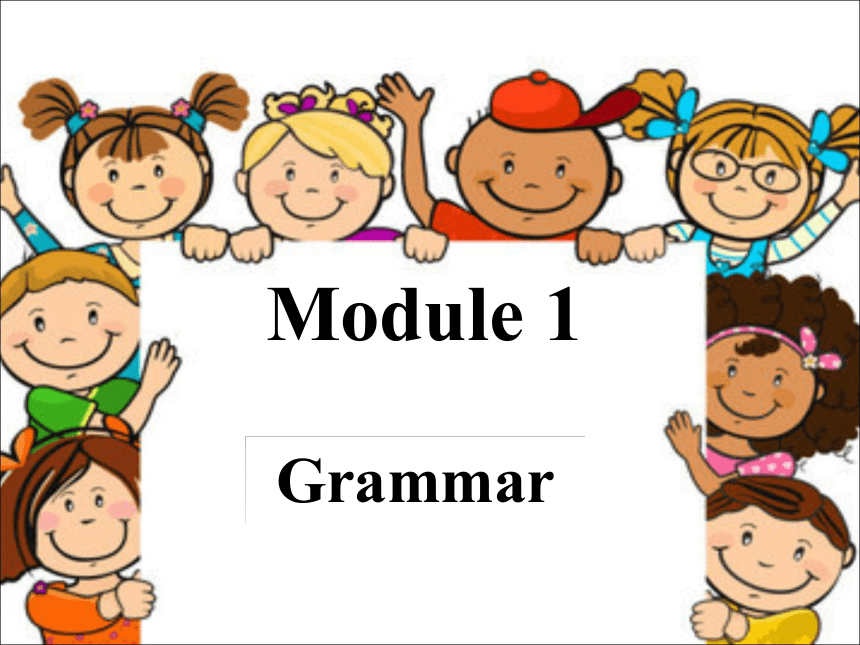 | |
| 格式 | zip | ||
| 文件大小 | 306.6KB | ||
| 资源类型 | 教案 | ||
| 版本资源 | 外研版 | ||
| 科目 | 英语 | ||
| 更新时间 | 2019-03-05 15:30:31 | ||
图片预览

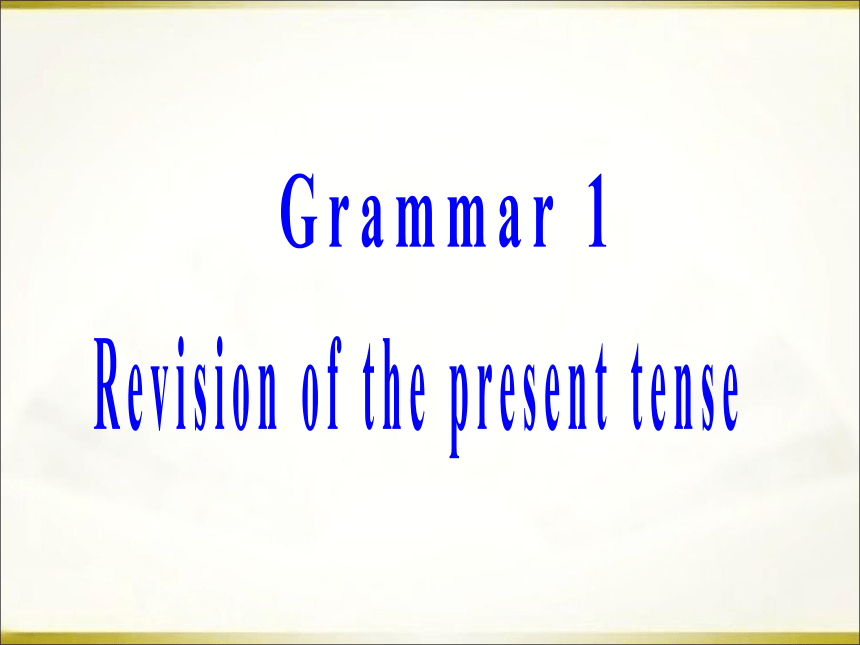
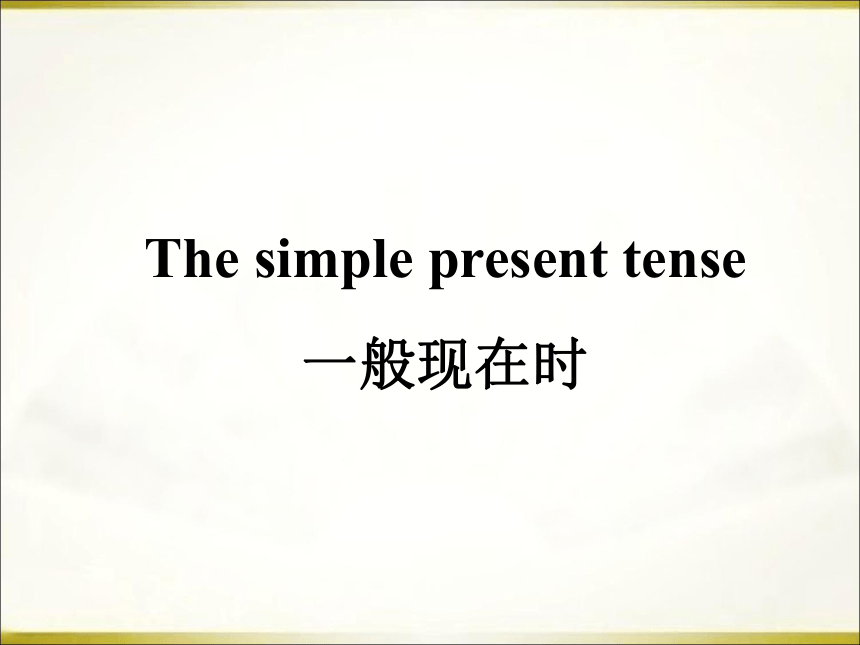
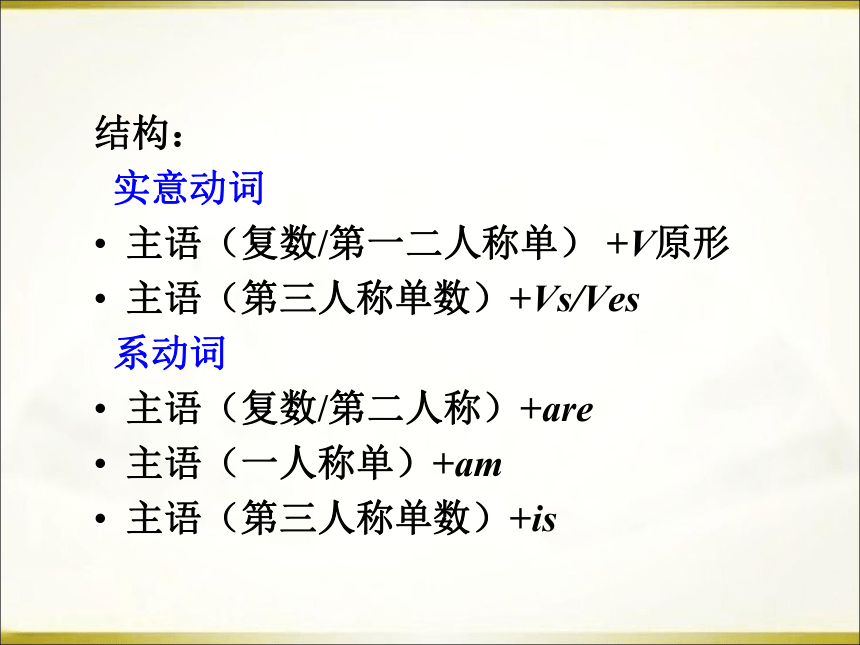
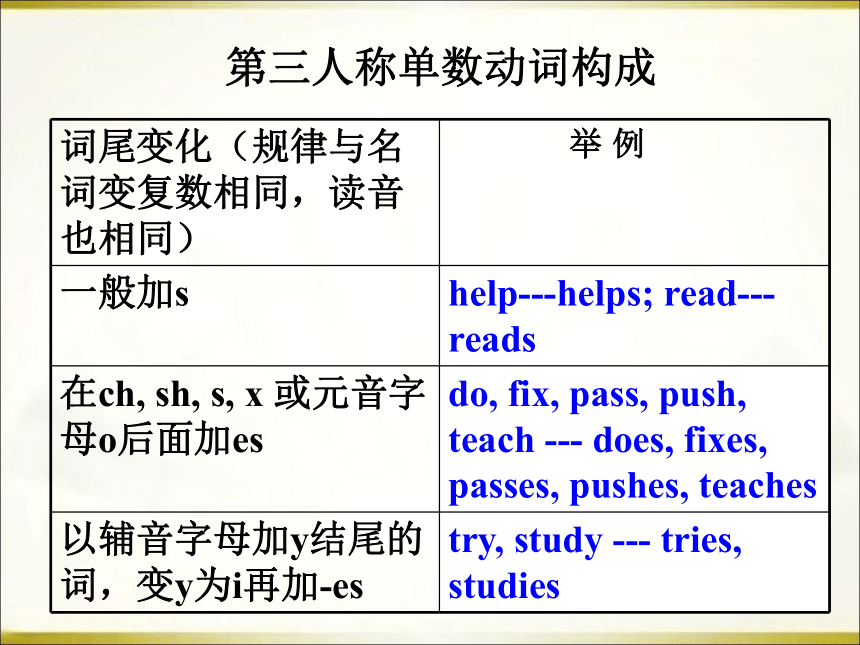
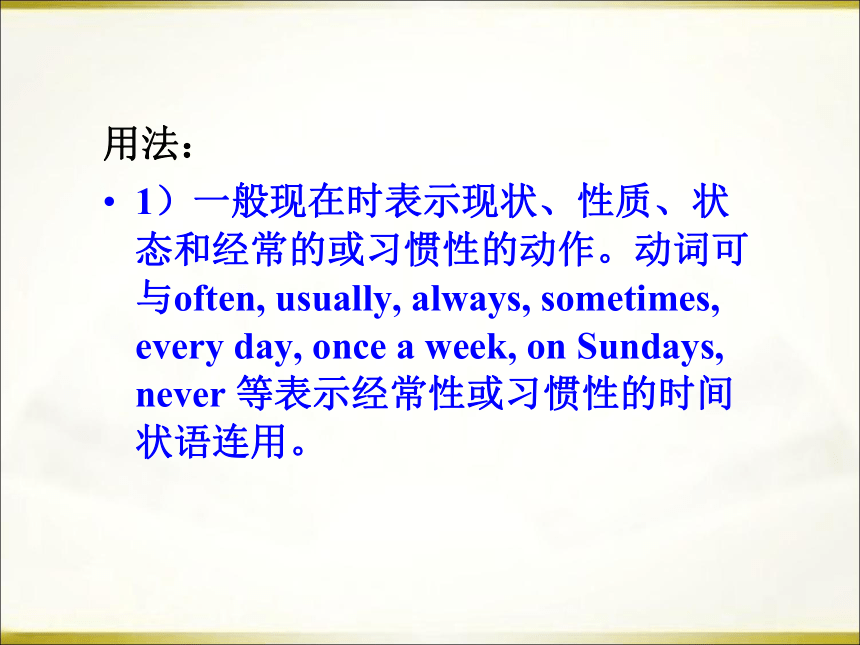
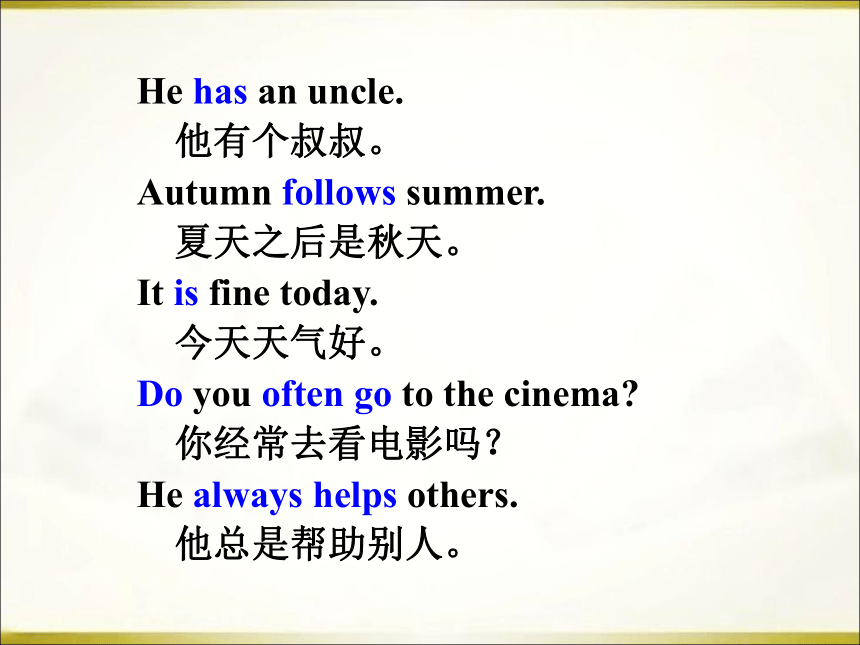
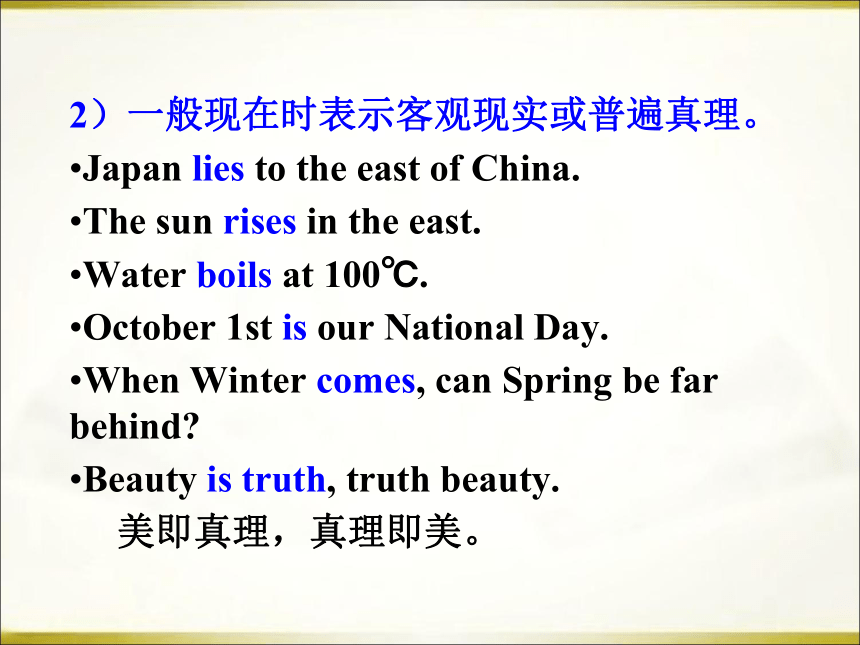
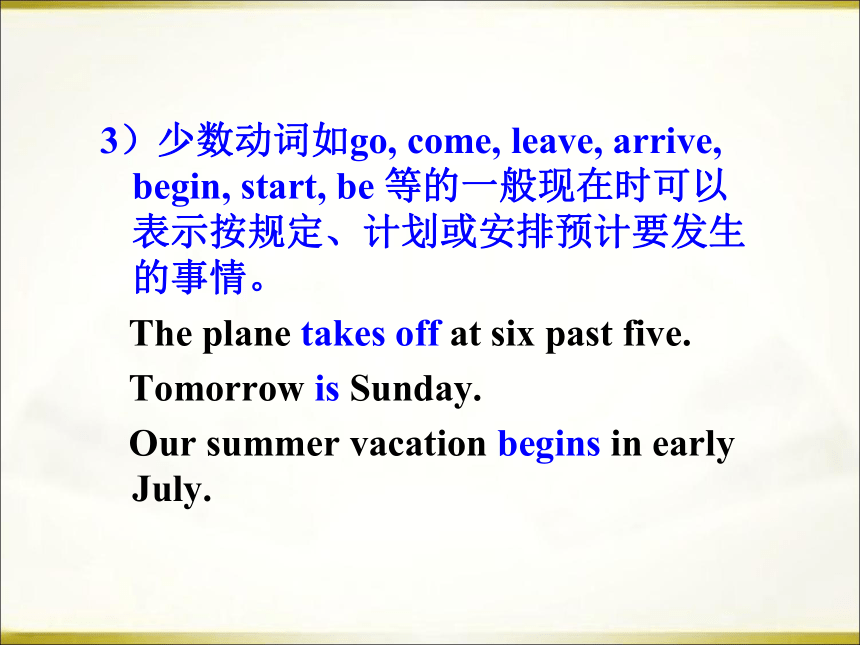
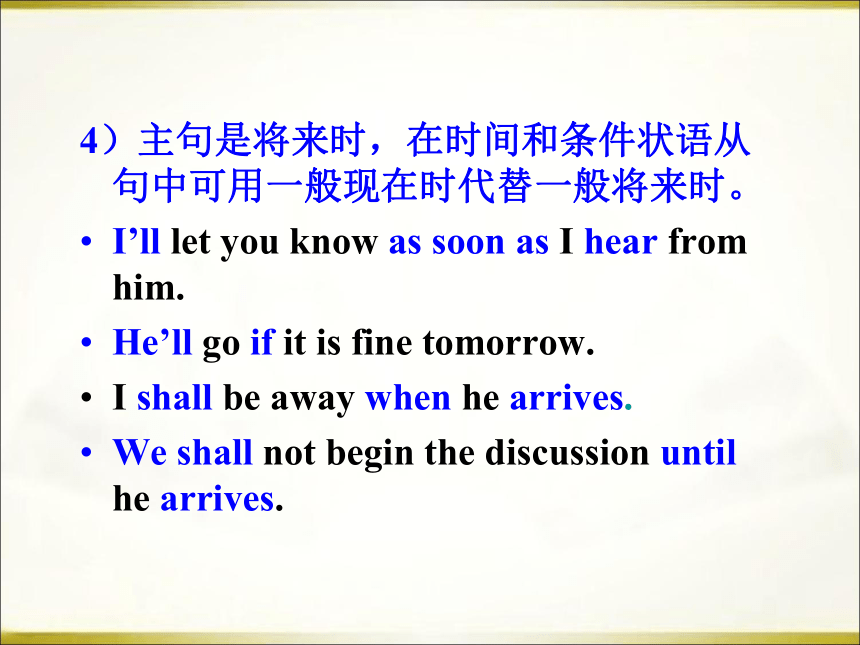
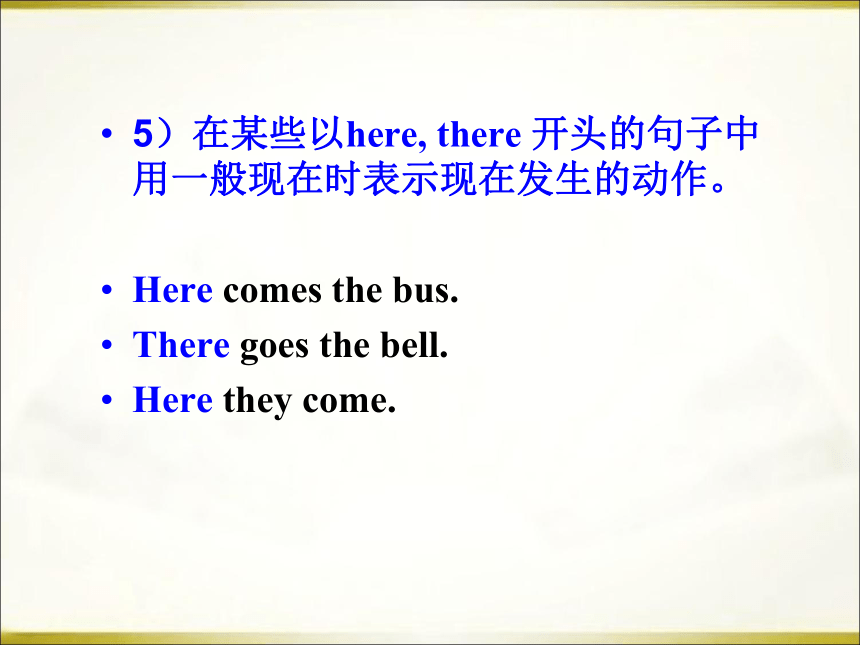
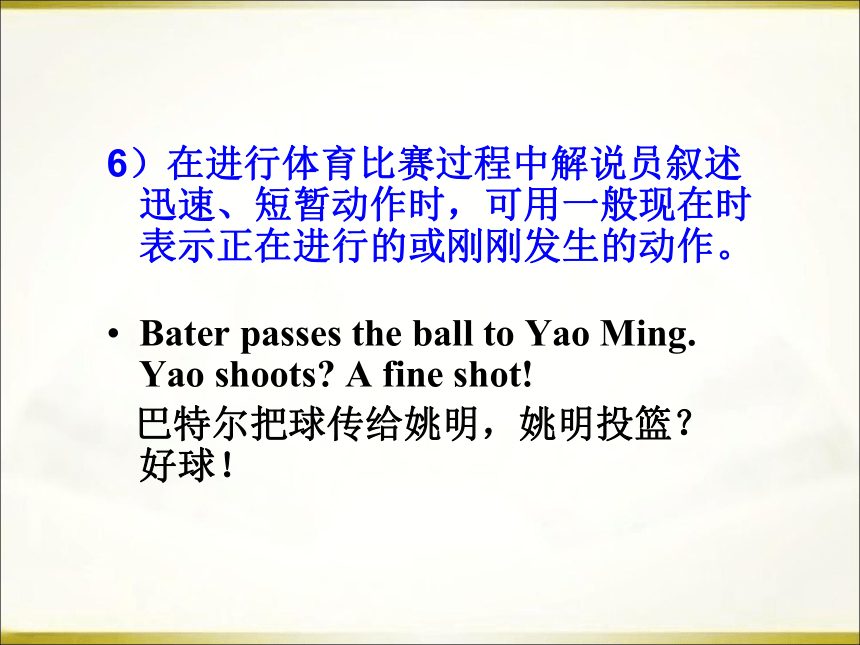
文档简介
课件44张PPT。GrammarModule 1Revision of the present tense Grammar 1The simple present tense 一般现在时 结构:
实意动词
主语(复数/第一二人称单) +V原形
主语(第三人称单数)+Vs/Ves
系动词
主语(复数/第二人称)+are
主语(一人称单)+am
主语(第三人称单数)+is第三人称单数动词构成用法:
1)一般现在时表示现状、性质、状态和经常的或习惯性的动作。动词可与often, usually, always, sometimes, every day, once a week, on Sundays, never 等表示经常性或习惯性的时间状语连用。 He has an uncle.
他有个叔叔。
Autumn follows summer.
夏天之后是秋天。
It is fine today.
今天天气好。
Do you often go to the cinema?
你经常去看电影吗?
He always helps others.
他总是帮助别人。
2)一般现在时表示客观现实或普遍真理。
Japan lies to the east of China.
The sun rises in the east.
Water boils at 100℃.
October 1st is our National Day.
When Winter comes, can Spring be far behind?
Beauty is truth, truth beauty.
美即真理,真理即美。3)少数动词如go, come, leave, arrive, begin, start, be 等的一般现在时可以表示按规定、计划或安排预计要发生的事情。
The plane takes off at six past five.
Tomorrow is Sunday.
Our summer vacation begins in early July. 4)主句是将来时,在时间和条件状语从句中可用一般现在时代替一般将来时。
I’ll let you know as soon as I hear from him.
He’ll go if it is fine tomorrow.
I shall be away when he arrives.
We shall not begin the discussion until he arrives. 5)在某些以here, there 开头的句子中用一般现在时表示现在发生的动作。
Here comes the bus.
There goes the bell.
Here they come.
6)在进行体育比赛过程中解说员叙述迅速、短暂动作时,可用一般现在时表示正在进行的或刚刚发生的动作。 Bater passes the ball to Yao Ming. Yao shoots? A fine shot!
巴特尔把球传给姚明,姚明投篮?好球!7)在戏剧、电影等的剧本或图片的说明文字中,可用一般现在时表示动作。 When the curtain rises, Juliet is sitting at her desk. The phone rings. She picks it up and listens quietly.
幕启,朱丽叶坐在桌旁。电话铃响,她拿起听筒,静静地听着。The present continuous tense
现在进行时 1.现在进行时可以表示说话时正在发生的动作,常和now,right now,at this moment等时间状语及动词look,listen等连用,这是现在进行时的“暂时性”特征。
I’m sitting on a rock near the river with my friends.
Our guide is cooking supper.Look at the children over there. What __________________ (他们在干什么)?are they doing2.现在进行时可以表示目前一段时间内一直在发生的动作,但是说话时不一定在发生,常和 these days ,this week,at present等时间状语连用,这是现在进行时的“阶段性”特征。
We are enjoying our boat trip very much.
(这几天)我们坐船旅游非常高兴。
We are having a wonderful time.
我们(这几天)玩得很开心。 I don’t really work here; I __________ _________________________________ (只是来帮忙的) until the new secretary arrives.am just helping out以上现在进行时的两个用法是与一般现在时的重要区别所在:现在进行时表示的动作具有暂时性和阶段性,一般现在时表示的动作具有经常性。
—Is this raincoat yours?
—No, mine _________________ (hang) there behind the door.
正确答案为 is hanging。只要我的雨衣现在正在门后挂着,就可以说明this raincoat不是我的。 is hanging3.现在进行时可以表示现在不断发展变化的事情。
It's late Autumn. The weather is getting colder and colder.
现在是深秋了,天气变得越来越冷。
Selecting a mobile phone for personal use is no easy task because technology _____________ (change) so rapidly.is changing4.现在进行时可以表示将要发生的动作,不过这种用法只限于arrive,begin,come,drive,fly(乘飞机),go,go off,get to,leave,return,see off,stay,take(带走),take off(起飞)等动词。
When are you going off to Guangzhou?
How are you getting to the airport?I’ve won a two-day holiday to Florida. I ______________ (take) my mum. am taking5.现在进行时与always,all the time,again等词连用可以表示说话人赞叹或厌恶的思想感情。
He's always coming late.
他总是迟到。
(对他老迟到表示厌恶)You ___________ too much of your children. Once he fails, you both will break down. (expect)
你总是对孩子期望过高。一旦失败,你们俩都会崩溃的。答案:are always expecting
考查现在进行时态与always连用,表示埋怨、赞扬、责备等语气。 事实状态的动词 have, belong, possess, cost, owe, exist, include, contain, matter, weigh, measure, continue
2) 心理状态的动词 know, realize, think see, believe, suppose, imagine, agree, recognize, remember, want, need, forget, prefer, mean, understand, love, hate不用进行时的动词 3) 瞬间动词 accept, receive, complete, finish, give, allow, decide, refuse.
4) 系动词 seem, remain, lie, see, hear, smell, feel, taste, get, become, turn1. — Can I join the club, Dad?
— You can when you ______________ (get) a bit older.get2. —What’s that terrible noise?
—The neighbors ________________ (prepare) for a party.are preparing3.Susan decided not to work on the program at home because she didn’t want her parents to know what she _______________ (do).was doing4. Since I won the big prize, my telephone hasn't stopped ringing. People _____________ (phone) to ask how I am going to spend the money.are phoningMy father always _________ (come) back from
work very late.
2. The teacher is busy. He __________ (sleep) six hours a day.
3. Listen! Joan __________ (sing) in the classroom. She often _________ (sing) there.
4. __________ your brother __________(know) Japanese?
5. Where _______ you __________ (have) lunch every day?
6. The girl __________(like) wearing a skirt. Look! She __________(wear) a red skirt today.Fill in the blanks.comessleepsis singingsingsDoes knowdo havelikesis wearingMy First Day at Senior High
Today is my first day at Senior High. I always _________ (get up) very early. I _____________ (exercise) this month, so I ______(jog) every morning. I ______(walk) to school every day because I _____ (live) not far away from the school. Now I _________(sit) in the classroom and ________(listen) to my new teacher’s self-introduction. get up am exercising jogwalkliveam sittinglistening I must say I like her very much. She _________(smile) all the time. Everything about the new school is so exciting. I _______________ (write down) all my feelings now and I __________________ (look forward ) to the next day at my senior high school. smilesam writing down am looking forward “Life is like walking in the snow”, Granny used to say, “because every step _____________ (show).”
2. Food supplies in the flood-stricken area _____________ (run) out. We must act immediately before there’s none left.经典例题showsare running3. “The moment _____________ (come) soon,” he thought to himself, waiting nervously.
4. — Look! Somebody _____________ (clean) the sofa.
— Well, it wasn’t me. I didn’t do it.is cominghas cleaned5. Always _______________ (keep) in mind that your main task is to get this company running smoothly.keepAdjective ending in -ing and -edGrammar 2He had a pleased smile on his face.
He told me the news in a very excited voice.
He is frightened.
He is frightening.
I read an interested expression on his face.
I read an interesting expression on his face.Read and translate the sentences. The –ing form describes the people or things that caused the feeling
The –ed form tells us how people feelFind adjectives ending in -ing and –ed.amazing interesting
boring embarrassing
exciting surprising
pleasing … amazed interested
bored embarrassed
excited surprised
pleased … Complete the sentences.bored / boring
I wasn’t _______ with the lesson.
The journey home from school was ________.boredboring2. interested / interesting
I was very _________ in her
teaching method.interested3. amazed / amazing
The computer screen is absolutely
__________.amazing4. embarrassed / embarrassing
Group work activities won’t make
you ___________ because you can
keep quiet if you want to. embarrassed
实意动词
主语(复数/第一二人称单) +V原形
主语(第三人称单数)+Vs/Ves
系动词
主语(复数/第二人称)+are
主语(一人称单)+am
主语(第三人称单数)+is第三人称单数动词构成用法:
1)一般现在时表示现状、性质、状态和经常的或习惯性的动作。动词可与often, usually, always, sometimes, every day, once a week, on Sundays, never 等表示经常性或习惯性的时间状语连用。 He has an uncle.
他有个叔叔。
Autumn follows summer.
夏天之后是秋天。
It is fine today.
今天天气好。
Do you often go to the cinema?
你经常去看电影吗?
He always helps others.
他总是帮助别人。
2)一般现在时表示客观现实或普遍真理。
Japan lies to the east of China.
The sun rises in the east.
Water boils at 100℃.
October 1st is our National Day.
When Winter comes, can Spring be far behind?
Beauty is truth, truth beauty.
美即真理,真理即美。3)少数动词如go, come, leave, arrive, begin, start, be 等的一般现在时可以表示按规定、计划或安排预计要发生的事情。
The plane takes off at six past five.
Tomorrow is Sunday.
Our summer vacation begins in early July. 4)主句是将来时,在时间和条件状语从句中可用一般现在时代替一般将来时。
I’ll let you know as soon as I hear from him.
He’ll go if it is fine tomorrow.
I shall be away when he arrives.
We shall not begin the discussion until he arrives. 5)在某些以here, there 开头的句子中用一般现在时表示现在发生的动作。
Here comes the bus.
There goes the bell.
Here they come.
6)在进行体育比赛过程中解说员叙述迅速、短暂动作时,可用一般现在时表示正在进行的或刚刚发生的动作。 Bater passes the ball to Yao Ming. Yao shoots? A fine shot!
巴特尔把球传给姚明,姚明投篮?好球!7)在戏剧、电影等的剧本或图片的说明文字中,可用一般现在时表示动作。 When the curtain rises, Juliet is sitting at her desk. The phone rings. She picks it up and listens quietly.
幕启,朱丽叶坐在桌旁。电话铃响,她拿起听筒,静静地听着。The present continuous tense
现在进行时 1.现在进行时可以表示说话时正在发生的动作,常和now,right now,at this moment等时间状语及动词look,listen等连用,这是现在进行时的“暂时性”特征。
I’m sitting on a rock near the river with my friends.
Our guide is cooking supper.Look at the children over there. What __________________ (他们在干什么)?are they doing2.现在进行时可以表示目前一段时间内一直在发生的动作,但是说话时不一定在发生,常和 these days ,this week,at present等时间状语连用,这是现在进行时的“阶段性”特征。
We are enjoying our boat trip very much.
(这几天)我们坐船旅游非常高兴。
We are having a wonderful time.
我们(这几天)玩得很开心。 I don’t really work here; I __________ _________________________________ (只是来帮忙的) until the new secretary arrives.am just helping out以上现在进行时的两个用法是与一般现在时的重要区别所在:现在进行时表示的动作具有暂时性和阶段性,一般现在时表示的动作具有经常性。
—Is this raincoat yours?
—No, mine _________________ (hang) there behind the door.
正确答案为 is hanging。只要我的雨衣现在正在门后挂着,就可以说明this raincoat不是我的。 is hanging3.现在进行时可以表示现在不断发展变化的事情。
It's late Autumn. The weather is getting colder and colder.
现在是深秋了,天气变得越来越冷。
Selecting a mobile phone for personal use is no easy task because technology _____________ (change) so rapidly.is changing4.现在进行时可以表示将要发生的动作,不过这种用法只限于arrive,begin,come,drive,fly(乘飞机),go,go off,get to,leave,return,see off,stay,take(带走),take off(起飞)等动词。
When are you going off to Guangzhou?
How are you getting to the airport?I’ve won a two-day holiday to Florida. I ______________ (take) my mum. am taking5.现在进行时与always,all the time,again等词连用可以表示说话人赞叹或厌恶的思想感情。
He's always coming late.
他总是迟到。
(对他老迟到表示厌恶)You ___________ too much of your children. Once he fails, you both will break down. (expect)
你总是对孩子期望过高。一旦失败,你们俩都会崩溃的。答案:are always expecting
考查现在进行时态与always连用,表示埋怨、赞扬、责备等语气。 事实状态的动词 have, belong, possess, cost, owe, exist, include, contain, matter, weigh, measure, continue
2) 心理状态的动词 know, realize, think see, believe, suppose, imagine, agree, recognize, remember, want, need, forget, prefer, mean, understand, love, hate不用进行时的动词 3) 瞬间动词 accept, receive, complete, finish, give, allow, decide, refuse.
4) 系动词 seem, remain, lie, see, hear, smell, feel, taste, get, become, turn1. — Can I join the club, Dad?
— You can when you ______________ (get) a bit older.get2. —What’s that terrible noise?
—The neighbors ________________ (prepare) for a party.are preparing3.Susan decided not to work on the program at home because she didn’t want her parents to know what she _______________ (do).was doing4. Since I won the big prize, my telephone hasn't stopped ringing. People _____________ (phone) to ask how I am going to spend the money.are phoningMy father always _________ (come) back from
work very late.
2. The teacher is busy. He __________ (sleep) six hours a day.
3. Listen! Joan __________ (sing) in the classroom. She often _________ (sing) there.
4. __________ your brother __________(know) Japanese?
5. Where _______ you __________ (have) lunch every day?
6. The girl __________(like) wearing a skirt. Look! She __________(wear) a red skirt today.Fill in the blanks.comessleepsis singingsingsDoes knowdo havelikesis wearingMy First Day at Senior High
Today is my first day at Senior High. I always _________ (get up) very early. I _____________ (exercise) this month, so I ______(jog) every morning. I ______(walk) to school every day because I _____ (live) not far away from the school. Now I _________(sit) in the classroom and ________(listen) to my new teacher’s self-introduction. get up am exercising jogwalkliveam sittinglistening I must say I like her very much. She _________(smile) all the time. Everything about the new school is so exciting. I _______________ (write down) all my feelings now and I __________________ (look forward ) to the next day at my senior high school. smilesam writing down am looking forward “Life is like walking in the snow”, Granny used to say, “because every step _____________ (show).”
2. Food supplies in the flood-stricken area _____________ (run) out. We must act immediately before there’s none left.经典例题showsare running3. “The moment _____________ (come) soon,” he thought to himself, waiting nervously.
4. — Look! Somebody _____________ (clean) the sofa.
— Well, it wasn’t me. I didn’t do it.is cominghas cleaned5. Always _______________ (keep) in mind that your main task is to get this company running smoothly.keepAdjective ending in -ing and -edGrammar 2He had a pleased smile on his face.
He told me the news in a very excited voice.
He is frightened.
He is frightening.
I read an interested expression on his face.
I read an interesting expression on his face.Read and translate the sentences. The –ing form describes the people or things that caused the feeling
The –ed form tells us how people feelFind adjectives ending in -ing and –ed.amazing interesting
boring embarrassing
exciting surprising
pleasing … amazed interested
bored embarrassed
excited surprised
pleased … Complete the sentences.bored / boring
I wasn’t _______ with the lesson.
The journey home from school was ________.boredboring2. interested / interesting
I was very _________ in her
teaching method.interested3. amazed / amazing
The computer screen is absolutely
__________.amazing4. embarrassed / embarrassing
Group work activities won’t make
you ___________ because you can
keep quiet if you want to. embarrassed
